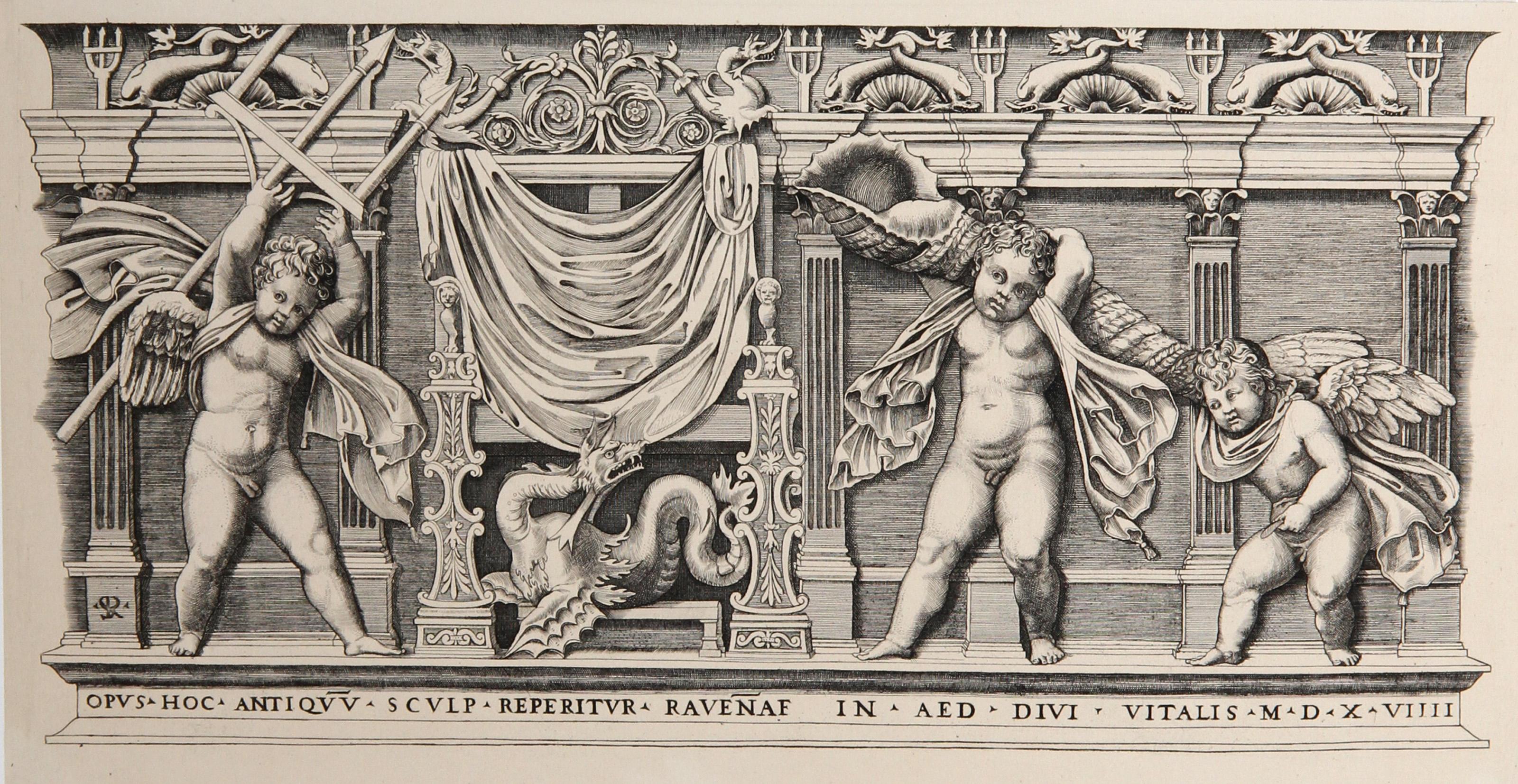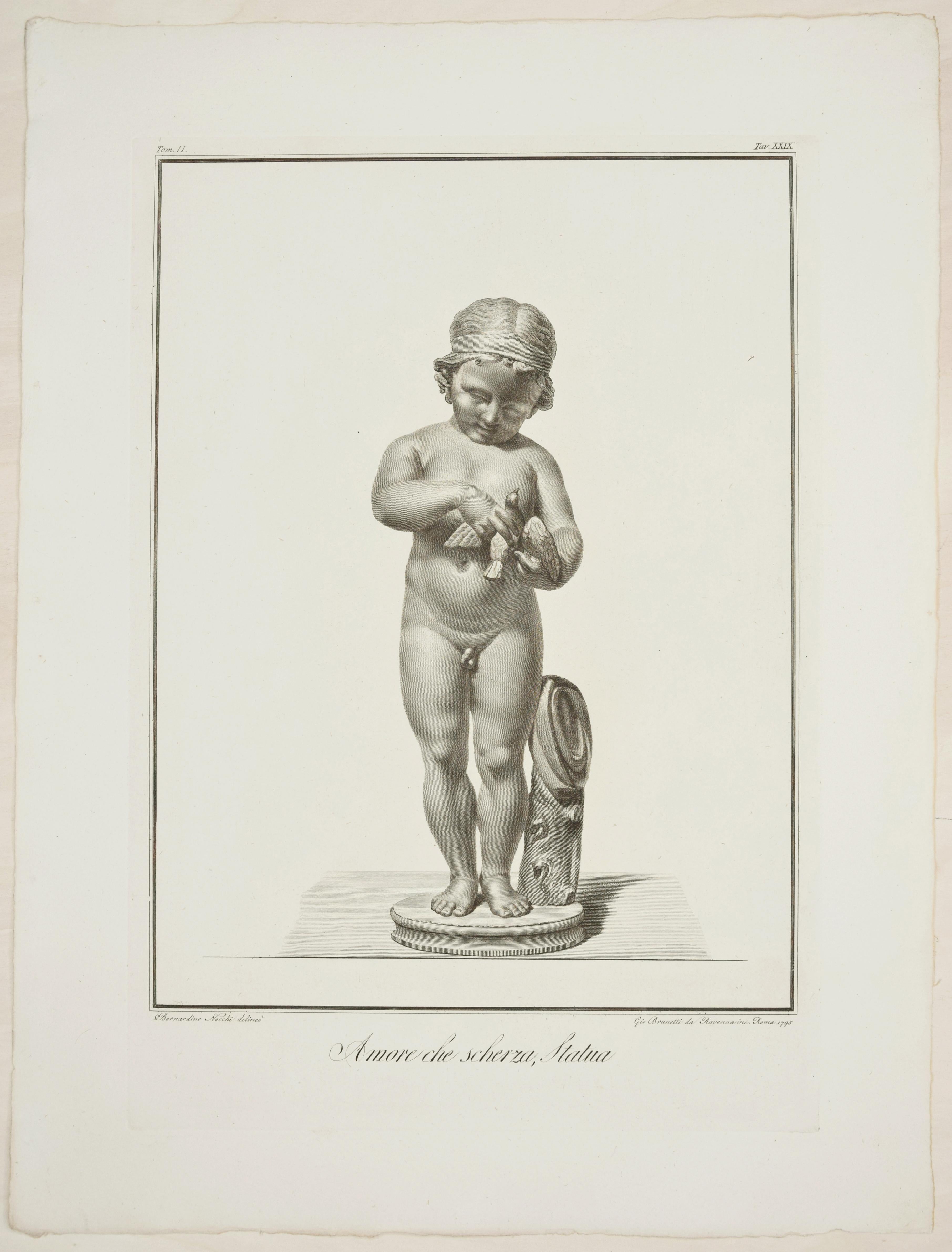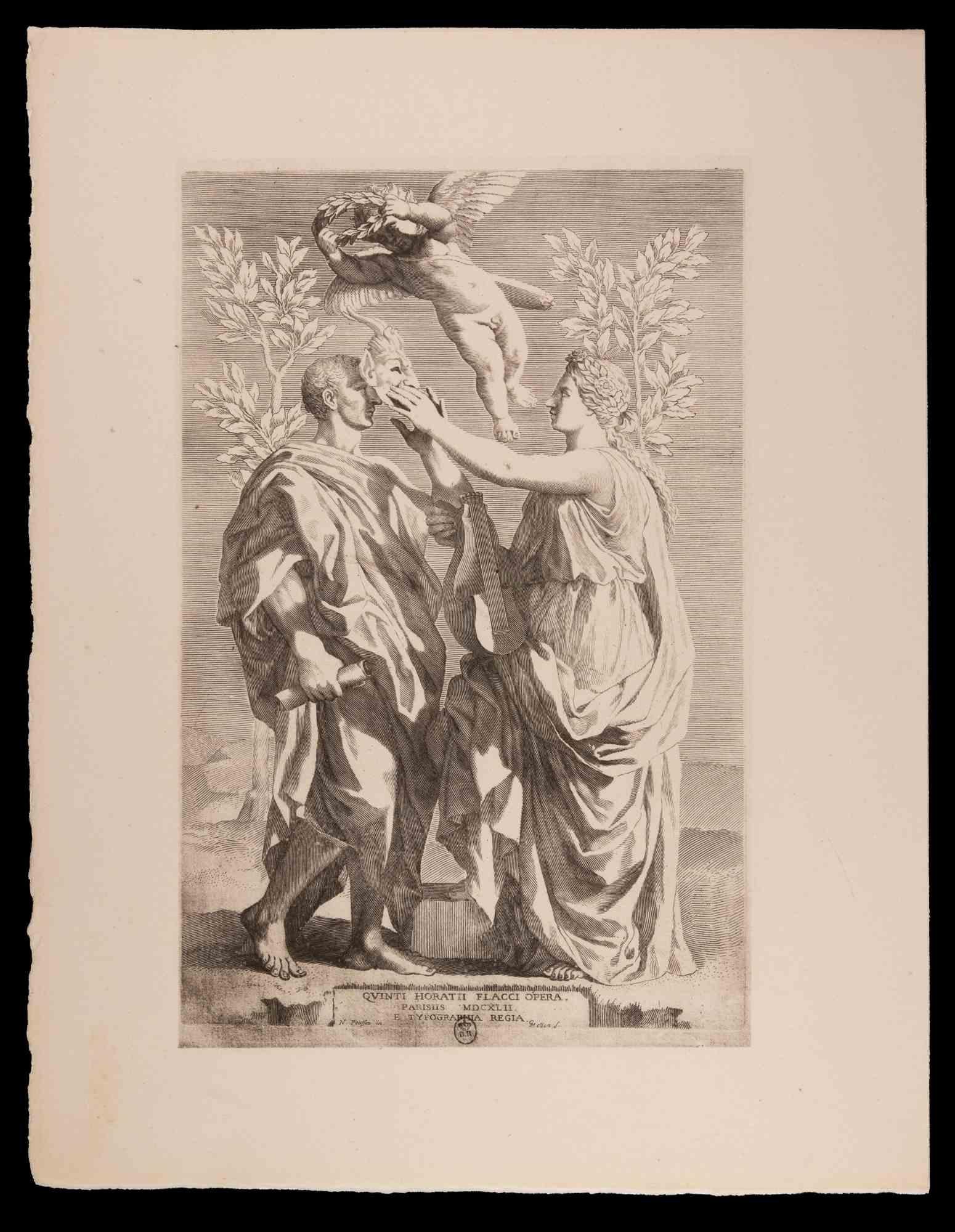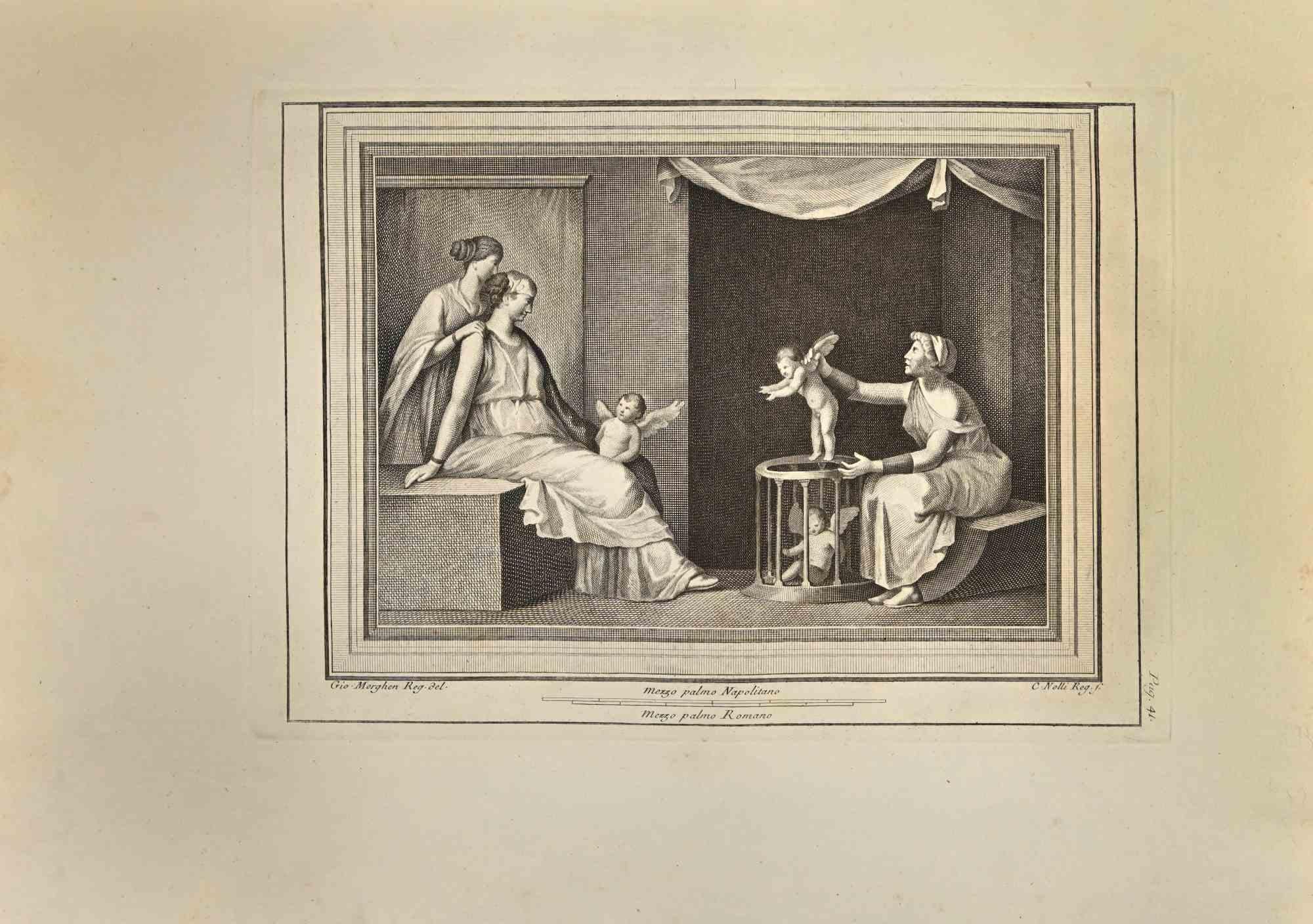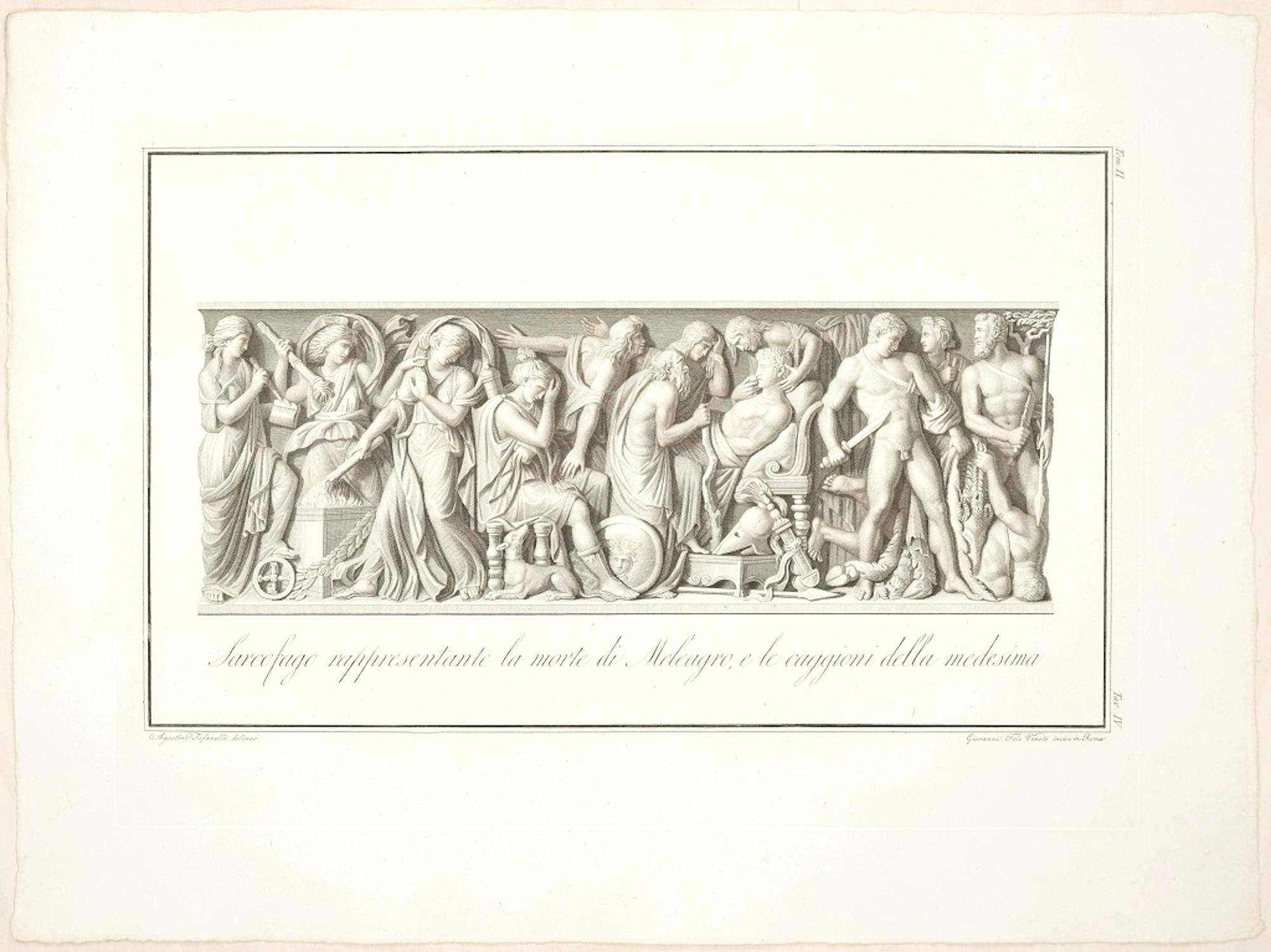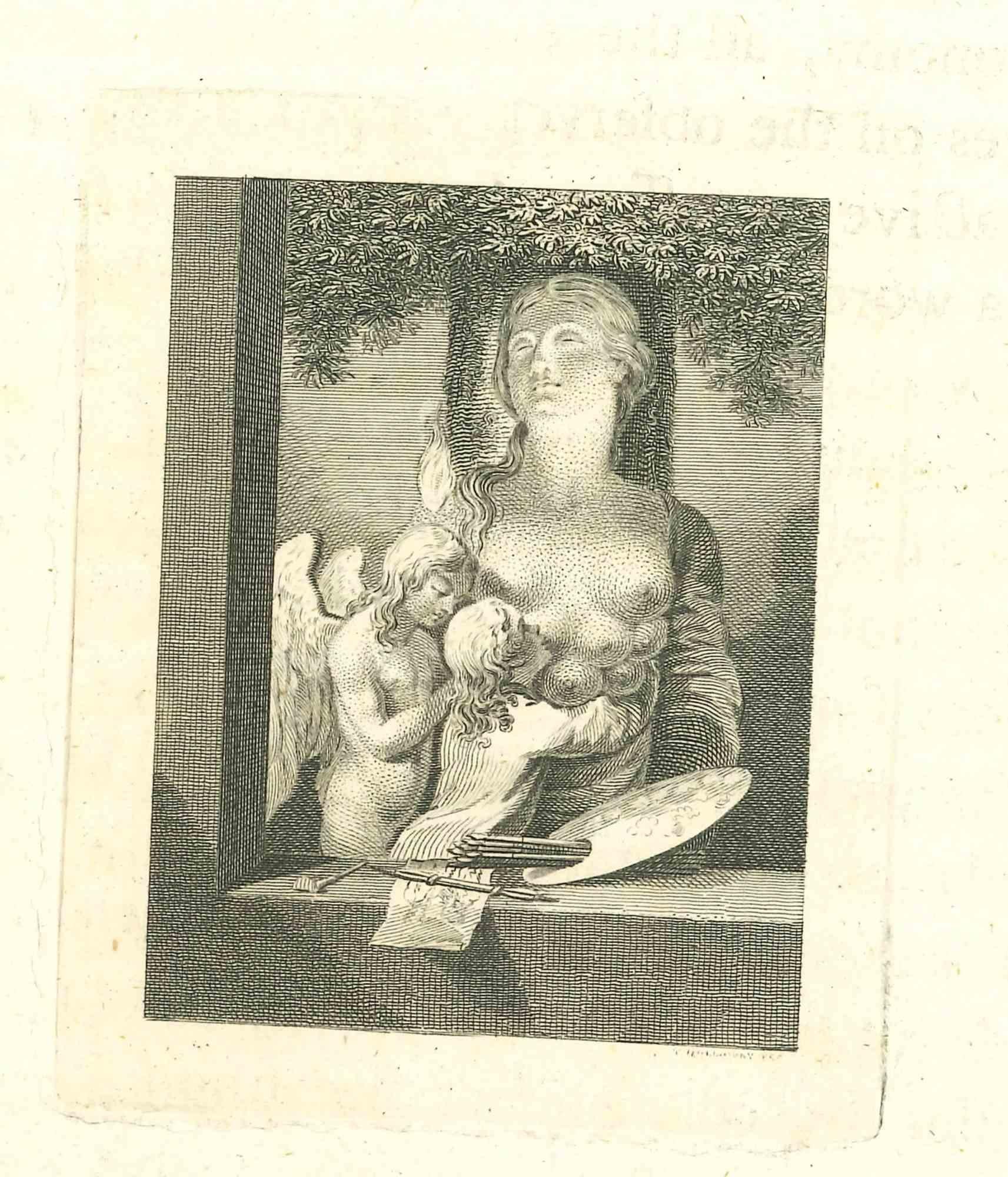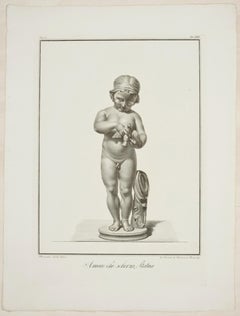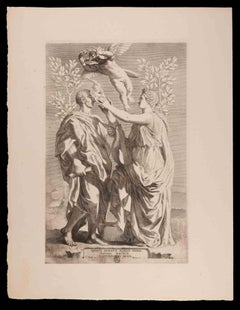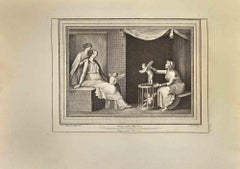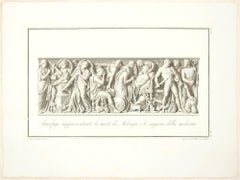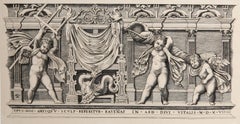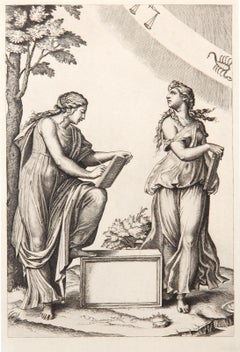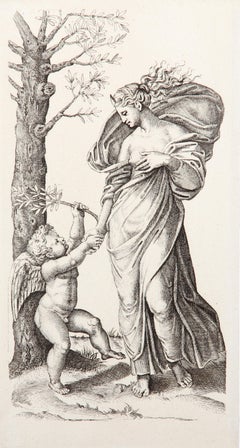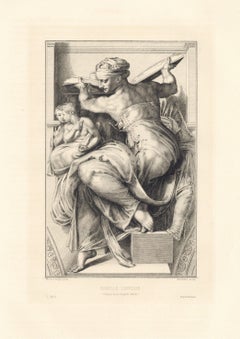Items Similar to Birth of Telefon, on a Bas-Relief - Original Etching by A. Campanella
Want more images or videos?
Request additional images or videos from the seller
1 of 5
Angelo CampanellaBirth of Telefon, on a Bas-Relief - Original Etching by A. Campanella1821
1821
$957.48
£703.84
€800
CA$1,310.02
A$1,463.17
CHF 760.31
MX$17,818.48
NOK 9,657.61
SEK 9,100.25
DKK 6,088.35
Shipping
Retrieving quote...The 1stDibs Promise:
Authenticity Guarantee,
Money-Back Guarantee,
24-Hour Cancellation
About the Item
“Nascita di Telefo, Bassorilievo” (Birth of Telefo, Bas-relief) is a beautiful black and white burin and etching on paper, realized by the artist Angelo Campanella, after Bernardino Nocchi, as the inscriptions on plates on lower margins report “Bernardino Nocchi delineò/ Angelo Campanella incise Roma”.
This original print is numbered on plate in Roman numerals on higher margin: “Tom II. /Tav. IX" and is a plate from the series "Illustrazioni de'Monumenti scelti Borghesiani già esistenti nella Villa sul Pincio (..)date ora per la prima volta in luce dal cav. Gio. Gherardo De Rossi e da Stefano Piale sotto la guida di Vincenzo Feoli", by Ennio Quirino Visconti, published by Stamperia de Romanis in Rome, 1821.
This old master’s original prints shows a beautiful piece of the Borghese's collection, a classical bas-rilief representing the birth of Telefo, a Greek hero and myth.
In excellent conditions with some light signs of the time with some sporadic minor stains along the higher margins,this wonderful etching has preserved still today his beauty and his fresh impression.
Illustrazioni de' Monumenti scelti Borghesiani
This collection in two volumes is a beautifully detailed catalog of classical sculptures collected by Prince Borghese (1730-1800) in his Villa on the Pincio. Ennio Quirino Visconti (1751 - 1818) wrote the texts that accompany the large branches depicting. To these writings, which were available by the son of the illustrious archaeologist, the publishers added only a few illustrations relating to some minor monument of which copper had already been engraved.
The engraved title-plate are signed by draughtsmen like Agostino Tofanelli, Stefano Tofanelli, Bernardino Nocchi, Domenico de Angelis or Teodoro Matteini, and by engravers Pietro Fontana Veneto, P. Vitali, Pietro Bettelini, Giovanni Folo Veneto, Giovanni Brunetti da Ravenna, Giovanni Ottaviani, Francesco Cecchini, Gio. Batta. Leonetti, Girolamo Carattoni, Domenico Cunego, Luigi Cunego, Alessandro Mochetti, Luigi Pizzi, Angelo Campanella or Giacomo Bossi.
The Volume I shows ancient full-length statues, of the Borghese warrior by Agasias (two plates), Greek gods and heroes and Roman famous historical figures; the last two plates represents antique Egyptian deities. There are plates representing ancient bas-reliefs, sarcophagi, of mythological subjects, the Borghese Vase, portrait busts, a vase on an altar, two statues of Amor; and two modern statues, by Bernini (the Apollo and Daphne, and the David).
«Très bel ouvrage» writes Brunet, «Grand ouvrage, le seul qui mérite, parmi ceux sur la villa Borgese, de figurer dans le chapitre aux Galeries et Collections» Vinet said, looking at this plate.
Angelo Campanella (Rome, 1748 – 1815)
Angelo Campanella was an Italian painter and engraver, learned his art under Giovanni Volpato. He engraved the statues of twelve apostles found in the church of St. John Lateran in Rome, and some of the plates for Gavin Hamilton's Schola Itálica including The Presentation in the Temple after Fra Bartolommeo. Others engravings include Christ with the Disciples at Emmaus, The Massacre of the Innocents, and Psyche and Cupid after the great Raphael.
Bernardino Nocchi (Lucca, 1741 - Rome, 1812)
Bernardino Nocchi moved to Rome in 1769 with his colleague Stefano Tofanelli, entering the school of Niccolò Lapiccola where he developed a baroque style with neoclassical suggestions.
Bernardino Nocchi was noticed by Pope Pius VI, who in 1780 entrusted him with the painting of the Sacred Apostolic Palaces and then in 1785 with the Print Room of the Vatican Library. But he also works outside the capital, in Gubbio where in 1797 he realizes the transit of St. Joseph in the Church of San Secondo, in Spoleto, in Lucca and in Catania. Returning to Rome, Nocchi painted some of his best paintings: Prince Camillo Borghese in 1799, The apotheosis of Saint Prudenziana, Saint Novato and Saint Timothy in 1803 and Pius VII in 1807.
- Creator:Angelo Campanella (Italian)
- Creation Year:1821
- Dimensions:Height: 23.23 in (59 cm)Width: 17.33 in (44 cm)Depth: 0.04 in (1 mm)
- Medium:
- Movement & Style:
- Period:
- Framing:Framing Options Available
- Condition:Insurance may be requested by customers as additional service, contact us for more information.
- Gallery Location:Roma, IT
- Reference Number:Seller: M-1015751stDibs: LU65034441051
About the Seller
4.9
Platinum Seller
Premium sellers with a 4.7+ rating and 24-hour response times
1stDibs seller since 2017
7,589 sales on 1stDibs
Typical response time: 2 hours
- ShippingRetrieving quote...Shipping from: Monaco, Monaco
- Return Policy
Authenticity Guarantee
In the unlikely event there’s an issue with an item’s authenticity, contact us within 1 year for a full refund. DetailsMoney-Back Guarantee
If your item is not as described, is damaged in transit, or does not arrive, contact us within 7 days for a full refund. Details24-Hour Cancellation
You have a 24-hour grace period in which to reconsider your purchase, with no questions asked.Vetted Professional Sellers
Our world-class sellers must adhere to strict standards for service and quality, maintaining the integrity of our listings.Price-Match Guarantee
If you find that a seller listed the same item for a lower price elsewhere, we’ll match it.Trusted Global Delivery
Our best-in-class carrier network provides specialized shipping options worldwide, including custom delivery.More From This Seller
View AllAmore Scherza - Original Etching by G. B. da Ravenna after Bernardino Nocchi
By Giovanni Brunetti da Ravenna
Located in Roma, IT
“Amore che scherzo, Statua” (Joking Eros, Statue) is a wonderful black and white etching on paper, realized by the artist Giovanni Brunetti da Ravenna, after Bernardino Nocchi as the inscriptions on plates on lower margins report “Bernardino Nocchi delineò/ Gio Brunetti da Ravenna inc. Roma 1795”.
This original print is numbered on plate in Roman numerals on higher right corner “Tav. XXIX” and is a plate from the series "Illustrazioni de'Monumenti scelti Borghesiani già esistenti nella Villa sul Pincio (..)date ora per la prima volta in luce dal cav. Gio. Gherardo De Rossi e da Stefano Piale sotto la guida di Vincenzo Feoli", by Ennio Quirino Visconti, published by Stamperia de Romanis in Rome, 1821.
This old master’s original prints representing a precious piece of the Borghese collection, an Eros statue caressing a sparrow, is in excellent conditions with some light signs of the time (some little whormholes on the left margin beyond the marginal line of the matrix) but with fresh impression.
Illustrazioni de'Monumenti scelti Borghesiani
This collection in two volumes is a beautifully detailed catalog of classical sculptures collected by Prince Borghese (1730-1800) in his Villa on the Pincio. Ennio Quirino Visconti (1751 - 1818) wrote the texts that accompany the large branches depicting. To these writings, which were found and made available by the son of the illustrious archaeologist, the publishers added only a few illustrations relating to some minor monument of which copper had already been engraved.
The engraved title-plate are signed by draughtsmen like Agostino Tofanelli, Stefano Tofanelli, Bernardino Nocchi, Domenico de Angelis or Teodoro Matteini, and by engravers Pietro Fontana Veneto, P. Vitali, Pietro Bettelini, Giovanni Folo Veneto, Giovanni Brunetti da Ravenna, Giovanni Ottaviani, Francesco Cecchini, Gio. Batta. Leonetti, Girolamo Carattoni, Domenico Cunego, Luigi Cunego, Alessandro Mochetti, Luigi Pizzi, Angelo Campanella or Giacomo Bossi.
The Volume I shows ancient full-length statues, of the Borghese warrior...
Category
1820s Old Masters Figurative Prints
Materials
Etching
The Work of Horace - Original Etching after Claude Mellan - 19th Century
By Claude Mellan
Located in Roma, IT
The Work of Horace is an Original Etching realized after Claude Mellan (1598-1688).
The artwork is in good condition included a white cardboard passpart...
Category
19th Century Modern Figurative Prints
Materials
Etching
Carlo Nolli - Etching by Carlo Nolli - 18th Century
By Carlo Nolli
Located in Roma, IT
Liberation of Angels from "Antiquities of Herculaneum" is an etching on paper realized by Carlo Nolli in the 18th Century.
Signed on the plate.
Good conditions with folding, a cut,...
Category
Late 18th Century Old Masters Figurative Prints
Materials
Etching
The Death of Meleagro - Etching by Giovanni Foto Veneto - 1821
By Giovanni Foto Veneto
Located in Roma, IT
“Sarcofago rappresentante la morte di Meleagro” (Sarcophagus representing the Meleagro's death) is a beautiful black and white burin and etching on paper, realized by the Italian artist Giovanni Folo...
Category
1820s Modern Figurative Prints
Materials
Etching
Mythological Scene - Etching by Thomas Holloway - 1810
By Thomas Holloway
Located in Roma, IT
Mythological Scene is an original artwork realized by Thomas Holloway for Johann Caspar Lavater's "Essays on Physiognomy, Designed to promote the Knowledge and the Love of Mankind",...
Category
1810s Modern Figurative Prints
Materials
Etching
Ancient Roman Relief - Original Etching by Vincenzo Campana - 18th Century
By Vincenzo Campana
Located in Roma, IT
Ancient Roman Relief, from the series "Antiquities of Herculaneum", is an original etching on paper realized by Vincenzo Campana in the 18th century.
Signed on the plate on the lowe...
Category
18th Century Old Masters Figurative Prints
Materials
Etching
You May Also Like
Le Bas Relief aux Trois Amours, Heliogravure by Marco Dente
Located in Long Island City, NY
Marco Dente, After by Amand Durand, Italian (1493 - 1527) - Le Bas Relief aux Trois Amours, Year: circa 1878, Medium: Heliogravure, Size: 7.5 x 14.5 in. ...
Category
1870s Old Masters Prints and Multiples
Materials
Etching
Les deux femmes au Zodiaque, Heliogravure by Marcantonio Raimondi
By Marcantonio Raimondi
Located in Long Island City, NY
Marcantonio Raimondi, After by Amand Durand, Italian (1480 - 1534) - Les deux femmes au Zodiaque, Year: 1875, Medium: Heliogravure, Size: 12 x 8 in. (30.48 x 20.32 cm), Printer: A...
Category
1870s Old Masters Prints and Multiples
Materials
Etching
La paix, Heliogravure by Marcantonio Raimondi
By Marcantonio Raimondi
Located in Long Island City, NY
Marcantonio Raimondi, After by Amand Durand, Italian (1480 - 1534) - La paix, Year: 1875, Medium: Heliogravure, Size: 9.5 x 5 in. (24.13 x 12.7 cm), Printer: Amand Durand, Descrip...
Category
1870s Old Masters Prints and Multiples
Materials
Etching
"Sibylle Libyque" etching
Located in Henderson, NV
Medium: etching. Etched by Adrien Didier after the figure by Michelangelo in the Sistine Chapel known as The Libyan Sibyl. This impression on cream laid paper was printed in 1875 at ...
Category
1870s Prints and Multiples
Materials
Etching
La cassolette, Heliogravure by Marcantonio Raimondi
By Marcantonio Raimondi
Located in Long Island City, NY
Marcantonio Raimondi, After by Amand Durand, Italian (1480 - 1534) - La cassolette, Year: 1875, Medium: Heliogravure, Size: 12.5 x 7 in. (31.75 x 17.78 cm), Printer: Amand Durand,...
Category
1870s Old Masters Prints and Multiples
Materials
Etching
La Foi, Old Masters Heliogravure Etching by Marcantonio Raimondi
By Marcantonio Raimondi
Located in Long Island City, NY
Marcantonio Raimondi, After by Amand Durand, Italian (1480 - 1534) - La Foi, Year: 1875, Medium: Heliogravure, Size: 9 x 4.75 in. (22.86 x 12.07 cm), Printer: Amand Durand, Descri...
Category
1870s Old Masters Prints and Multiples
Materials
Etching
More Ways To Browse
Greek Relief
Antique Bas Relief
Italian Bas Relief
Relief Bust
Egyptian Relief
Bust Of David
Copper Relief Sculpture
Neoclassical Bas Relief
Antique Transits
Antique Deity Statue
Bust Of David Sculpture
Pope Pius
Cupid Psyche
Antique Greek Vase Prints
Egyptian Statue Antique
Antique Egyptian Statues
Roman Altar
Antique Copper Statue
